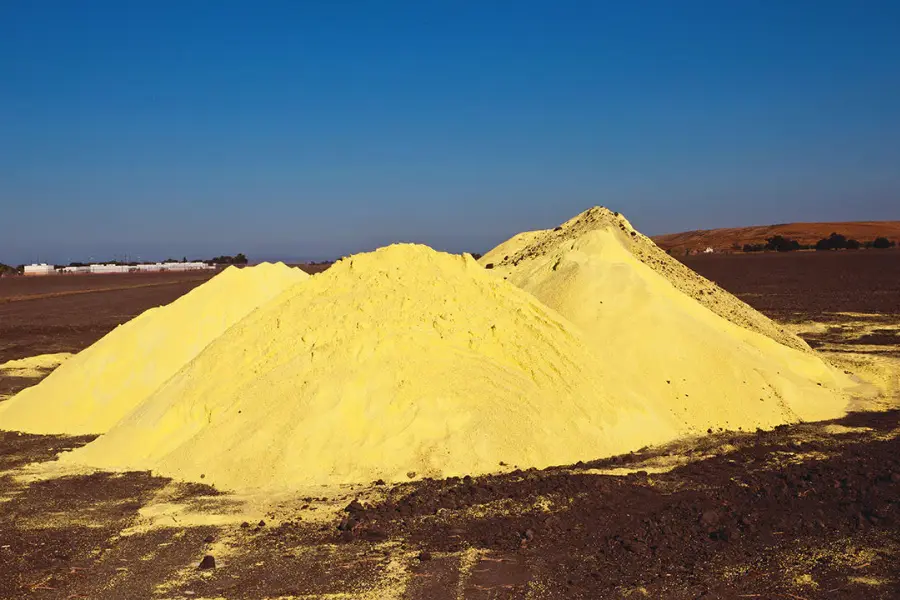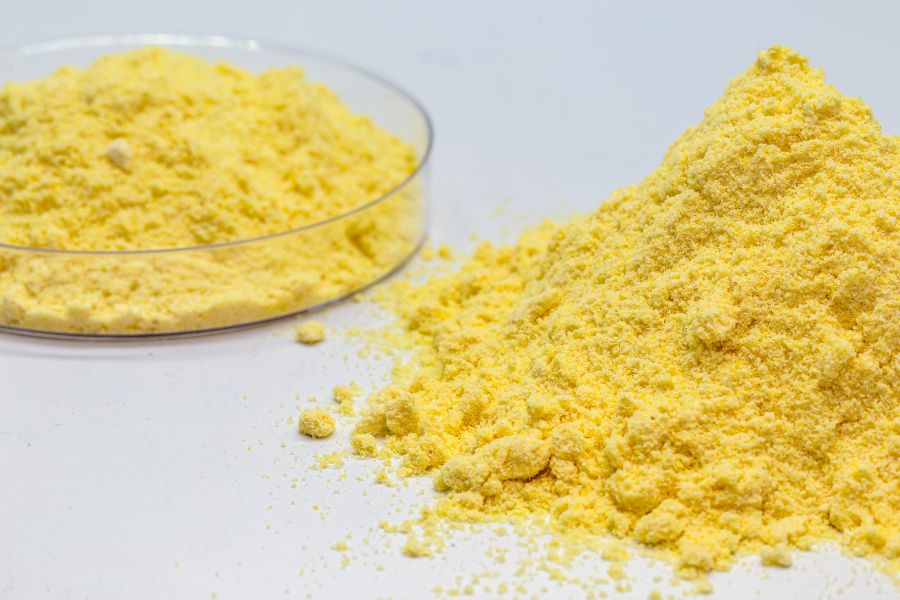
Is sulfur safe for humans? Evaluating the Risks
March 5, 2024
How Is Sulfur Extracted From the Earth? A Technical Explanation
May 9, 2024The production of powdered sulfur, a key form of this element, raises pertinent concerns about the environmental impact of sulfur production. As the demand for powdered sulfur continues to rise, fueled by diverse industrial applications, understanding its environmental footprint becomes imperative.
Sulfur is a vital element in various industrial processes and applications, serving as a fundamental component in the global economy. From agriculture to manufacturing, sulfur plays essential roles in soil enrichment, chemical synthesis, and product formulation.
In this post, we examine the multifaceted environmental impact of powdered sulfur production, exploring its effects on air and water quality, soil health, and biodiversity. Additionally, we scrutinize potential mitigation strategies aimed at promoting sustainable sulfur production practices.
Powdered Sulfur Production
Powdered sulfur production is the process of refining raw sulfur into a fine powder form. This production typically involves several steps, starting with the extraction of elemental sulfur from natural sources such as sulfur deposits, oil and gas extraction operations, or as a byproduct of metal smelting processes.
Once extracted, the sulfur undergoes purification to remove impurities and contaminants, ensuring high-quality end products. The purified sulfur is then processed into powdered form through various techniques such as grinding or milling, resulting in a fine powder with specific particle size distributions.
This powdered sulfur finds widespread use across industries, including agriculture (as a soil amendment and pesticide), chemicals (in the production of sulfuric acid and other chemical compounds), and manufacturing (in the production of rubber, plastics, and pharmaceuticals).
However, the production of powdered sulfur can have significant environmental impacts. These may include emissions of sulfur dioxide (SO2) and other pollutants during extraction and refining processes, contamination of water bodies from runoff and waste disposal, soil degradation due to sulfur deposition, and potential harm to ecosystems and human health.
The Environmental Impact of Sulfur Production

Understanding and addressing the environmental implications of powdered sulfur production is crucial for promoting sustainable practices and minimizing adverse effects on the environment and communities.
Air Pollution
The process of sulfur from extraction to refinement to its eventual use has environmental impacts. During the extraction and refining processes, sulfur compounds release many pollutants into the atmosphere. Sulfur dioxide (SO2), a byproduct of these activities, is a major contributor to air pollution.
When released into the air, SO2 can undergo chemical reactions, forming sulfuric acid aerosols, which contribute to respiratory issues and degrade air quality. Moreover, combustion of sulfur-containing fuels, such as coal and oil, releases additional SO2 emissions, exacerbating air pollution levels.
These emissions not only pose risks to human health but also contribute to the formation of acid rain, which can have far-reaching ecological consequences.
Water Pollution
Powdered sulfur production also poses significant risks to water quality. Runoff from sulfur extraction sites and improper disposal of waste products can contaminate water bodies, endangering aquatic ecosystems and human health.
Sulfur compounds, when washed into rivers, lakes, and oceans, can lead to water acidification, disrupting aquatic habitats and endangering aquatic species. Furthermore, the presence of sulfur compounds in water sources can compromise water quality for human consumption, posing serious health risks.
Thus, the unchecked discharge of sulfur pollutants into water bodies represents a critical environmental challenge that demands urgent attention.
Soil Degradation
The environmental impact of powdered sulfur production extends beyond air and water pollution to include soil degradation. Soil serves as a crucial component of terrestrial ecosystems, supporting plant growth and sustaining biodiversity.
However, excessive sulfur deposition can disrupt soil pH levels, leading to soil acidification. Acidic soils not only hinder plant growth but also degrade soil structure, reducing fertility and impeding nutrient uptake.
Consequently, agricultural productivity may suffer, affecting food security and livelihoods in farming communities. Moreover, soil acidification can have cascading effects on ecosystem health, disrupting the delicate balance of terrestrial ecosystems and threatening biodiversity.
Mitigation Strategies
Addressing the environmental challenges associated with powdered sulfur production requires a multifaceted approach encompassing technological innovation, regulatory measures, and stakeholder collaboration.
- Technological Advancements: Advances in sulfur extraction and processing technologies offer promising avenues for reducing environmental impacts. By adopting cleaner production methods and implementing emission control technologies, sulfur producers can minimize air and water pollution associated with sulfur production. For instance, the use of desulfurization technologies can help mitigate SO2 emissions from industrial processes, thereby reducing air pollution levels.
- Regulatory Measures: Strong regulatory frameworks are essential for ensuring environmental compliance and building sustainable practices in the sulfur production industry. Governments and regulatory authorities must enact and enforce stringent environmental regulations governing sulfur production activities. These regulations should encompass emission standards, waste management protocols, and environmental monitoring requirements to safeguard air, water, and soil quality.
- Collaborative Initiatives: Collaboration among stakeholders, including government agencies, industry players, environmental organizations, and local communities, is crucial for driving collective action towards sustainable sulfur production. Public-private partnerships can facilitate knowledge sharing, technology transfer, and capacity building initiatives aimed at promoting environmentally responsible practices in the sulfur industry.
Furthermore, promoting transparency and accountability within the sulfur supply chain can enhance traceability and facilitate the identification of environmental hotspots, enabling targeted interventions to mitigate environmental impacts effectively.
Final Thoughts
The environmental impact of powdered sulfur production is a complex issue that requires collaborative efforts from all stakeholders to address effectively. From air and water pollution to soil degradation, the environmental consequences of sulfur production are significant.
However, by adopting technological innovation, implementing robust regulatory frameworks, and building collaboration among stakeholders, we can pave the way towards more sustainable sulfur production practices.
As we shift to a greener economy, it is important to prioritize taking care of the environment. We must make sure that using sulfur doesn’t harm ecosystems or human health, finding a balance between its benefits and environmental protection.
By working together towards common goals, we can build a future where sulfur production contributes to sustainable development while protecting the planet for future generations.
Connect With Us
Contact us for an efficient and reliable experience in managing your petrochemical product needs. Upon reaching out, you will receive detailed information on our comprehensive services. Our experts will provide you with insights into how we tailor these services to the unique characteristics of petrochemical products. You will receive guidance on efficient transportation modes, secure loading processes, thorough quality control measures, and transparent communication regarding shipment status and delivery times.
To connect with Adept Trade instantly, reach out on WhatsApp at +971 50 886 1297 or drop an email at info@adept-trade.com



